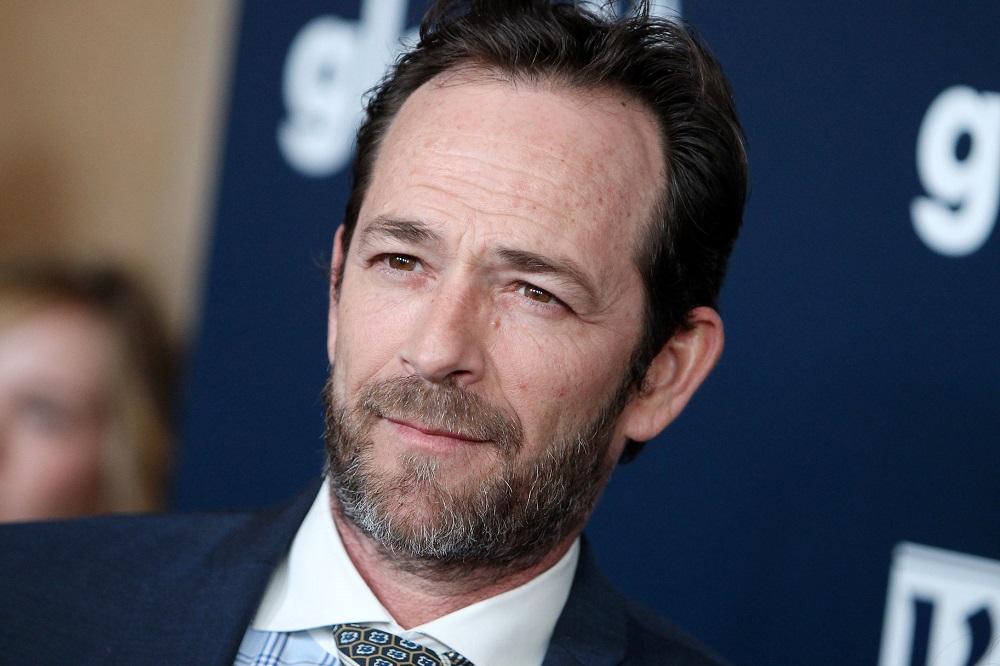No, 52 Isn’t Too Young for a Stroke
Luke Perry's death is a sad reminder.

The actor Luke Perry died yesterday, aged 52 years, from complications from a recent stroke. He was, from most accounts, a remarkably decent and humble guy despite having been a superstar at a young age. While I only caught a few episodes of his breakout hit “90210,” I’ve enjoyed his recent run as Archie’s dad on “Riverdale.”
His death hit home to many of us who are his contemporaries. I’m only a year older and my fiance is a month younger. But, while 52 is way too young to die, it’s apparently not unusually young for a stroke.
CNN (“Was Luke Perry too young for a stroke? No, they can happen at any age“):
The death of Luke Perry, after the actor suffered what his publicist said was a massive stroke, is evidence that the disease can affect people of any age, the American Heart Association said.
Perry, who starred in “Beverly Hills 90210” and “Riverdale,” died Monday. He was 52.
“Although stroke often affects older individuals, it is not only a disease of the elderly,” said Mitchell S. V. Elkind, chair of the American Stroke Association Advisory Committee. “There is evidence that stroke rates among young people are increasing in the United States and this requires additional research.”
A 2017 report by the American Academy of Neurology found that 15% of all ischemic strokes happen to young adults and adolescents. But a lack of research, awareness and frequency makes diagnosing the symptoms early on a challenge.
Ischemic strokes account for 87% of all stroke cases. They occur when a blood vessel becomes blocked by fatty deposits and blood has trouble passing through to the brain.
Other types of strokes include thrombotic ischemic stroke — triggered by a blocked vessel — and a hemorrhagic stroke, caused by weakened blood vessels that rupture and bleed into the brain.
The cause and type of Perry’s stroke has not been revealed. But Elkind said it’s important to know risk factors and symptoms.
The article goes on to list those.
Smoking, diabetes, high blood pressure, high blood cholesterol, obesity and other cardiovascular diseases put people at greater risk for stroke, the heart association said. Avoiding diets with high calories, lots of saturated fat, trans fat and sodium can reduce the risk, as can getting 150 minutes of activity each week, the association said.
While these dangers are well documented but not as well heeded. Remarkable, 38 million Americans still smoke despite decades of campaigning against the practice, skyrocketing prices, and social stigma. Most don’t get enough exercise and few eat anything close to the recommended diet.
I have no idea what led to Perry’s stroke. He looked to be in great shape but may well have had other risk factors.






I’m a prime candidate, tho the blood thinners may mitigate the chances. As long as I take them.
My brother had a mild stroke in his 30s, brought upon by an epileptic seizure. One of my cousins also recently had a stroke at that age. Both, fortunately, survived.
My cousin had a stroke a couple years ago. She was 50. Fortunately, she survived, but it’s been a hard road for her since.
I’ve known two young women who have had strokes, both were in their 30s when they had them. The first was decades ago–I was in my 20s and was shocked when a woman I knew through political work had a massive stroke. She ended up very incapacitated, needing around-the-clock care for years before passing away.
The second was more recent. She recognized the signs and went to the emergency room, where–presumably because of her age–she was told that she was probably having a migraine and should go home. She did not, and remained there for hours. She passed out there in the ER, where they determined she had had multiple strokes. She has about fully recovered. I’m still angry that she didn’t sue the pants off of that hospital.
We need to stop and examine this kind of sentiment because it’s what behind the “shock” of his death. Apologies if it sounds cruel but this stuff needs to be said.
52 isn’t “too young” to die – 52 is less then a decade away from the traditional definition of “elderly” . 52 is more then half a century old, on the tail end of middle age. 52 is old enough to have grandkids, developed debilitating diseases, have your genetics and body start to break down. You are *not* young if you are in your 50’s not matter what feel-good marketing and a society that fears aging tells you. Health risks – all of them – should start being on your mind in your 30’s as so to engage in prevention and awareness; not when you’re a few years shy of when they are supposed to hit. Too little, too late.
Modern medicine and lifestyles have enabled us to live good lives far beyond what our ancestors did but doesn’t change basic biological facts. Dying in your 20’s or 30’s is “dying too young” – dying in your 50’s is being a little ahead of the curve. If you are disregarding health issues as “only happening to old folks”, guess what? You’re older then you think and disease rarely respects what is the “proper age” for when it should strike. We buy a lot of the hype that 70 is the new 40 or whatever but remember, Mother Nature doesn’t care about slogans. Find out your family history, take into account your lifestyle, do the tests and never, *never* assume you’re too young for a disease to hit. There but for the grace of God go we….
James- Congratulations on your engagement!
If I had a chance to catch wind of it earlier, I missed it.
@KM:
Oh, I’m well aware that I’m not young anymore.
Still, Perry was born on October 11, 1966. According to the Social Security Life Expectancy Calculator, a male born on that date has an additional life expectancy of 29.9 years—dying at 82.3 years. The additional expectancy at 62, 67, and 70 is incremental but continues going up.
Yes, there are genetic factors. But science has cured or allowed us to live with a lot of the things that used to kill us. And just getting making it past infancy vastly increases our life expectancy.
Strokes can be caused by several things in addition to atherosclerosis. Congenital malformations in the heart and blood vessels, inflammatory diseases, and clotting disorders are some of these and can occur in younger people. Cocaine use is a real risk factor, and when I read of strokes or heart attacks in Hollywood or music industry people, I tend to think of that. It may be undeserved in this instance and simply reflect my prejudice. A ER doc friend has seen a lot of acute ischemic strokes after cocaine in people in their twenties and up. Let me say again that I have no basis for bringing this up in this specific case and am commenting on strokes in young people in general.
@Slugger: Good point, that there are potential other factors–including medications.
For women, birth control pills raise the risk of stroke–and women who suffer from migraine with aura are at higher risk for stroke. Any woman who has migraines with aura should talk to her doctor about the increased risk for stroke if she is using any hormonal birth control.
@Franklin:
I did not know James was engaged either. So glad to hear the news.
@KM: Exactly! I’m old enough to remember the days when having become 50 or so made you officially “old,” and most men died between 65 and 70, most women before they were 75 and blacks still frequently died before they were eligible to collect full
Social Security.
I remember reading a report in which a doctor cited a study he made noting that 007 novels were not particularly realistic (no kidding?) because if a man actually lived like James Bond, he would have died in his 50s. I reflected on that idea, but realized that in the 1960s–when Ian Fleming died, in 1964, at age 56–dying in one’s fifties wasn’t all that uncommon.
@Jen:
My doctor took me off them in my 30s because I began having migraines again. I had a couple as a teen, then none till I was 32. I told my doctor about the first one and she immediately stopped my prescription for birth control pills. I was not happy about this because aside from the obvious benefit, I was using them for severe menstrual cramps. Every month as I lied on the floor (seriously, I couldn’t walk the few steps extra steps to reach the bed because I was in so much pain) I pondered how much of my life I was willing to trade to avoid those debilitating cramps. I never reached an answer.
If I had been asked to make the choice, I probably would have taken the risk.
My friend has had two major strokes. One when was in early thirties and again in his late forties.
His brain, consciousness, self is completely intact with no damage, as is his base intelligence, but he has a pronounced slur now, and he has to search for the correct word or phrase which causes pauses in his speech pattern. His colleagues know he is fully him and bright as he always was and he has a bright professional future, but randos assume he is stupid because of his slurred speech.
One of the cool side-effects is that he now saves up his comments and unleashes them at the best possible time like a boss assassin. He saves ’em up and hones them in his head before fully unleashing them – and they are brutal! I dig that!
One can recover fully from a major stroke and speak without anyone knowing you had a stroke. You can also recover all cognitive functions and still slur you speech.
A stupidly prevalent theory is that you can will your way past that by good thoughts and a positive mental approach. False, false, false. I never want to squelch someone’s hope, but stroke can have lifelong effects that cannot be willed away or pushed through by the power of positive thinking.
Stroke survivors that have noticeable after-effects are as heroic and brave and strong as those who seemingly recover more “completely” and eventually speak freely and fluently.